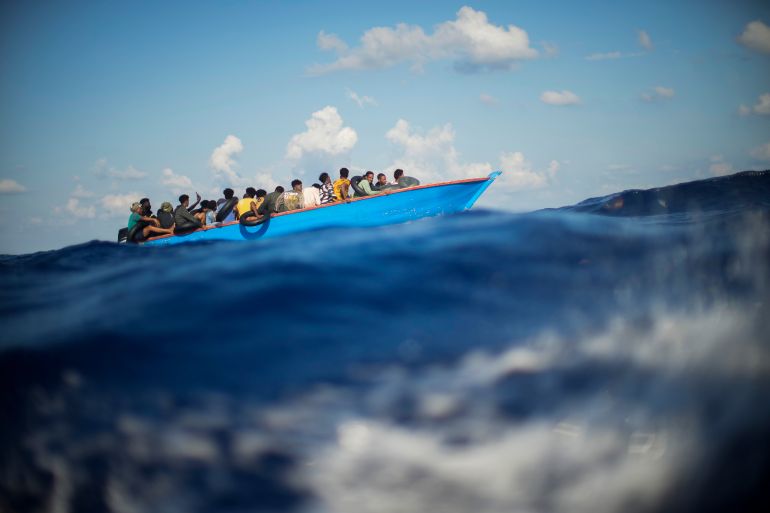Rescue group decries Libya coastguard ramming into migrant boat
Video posted by Sea-Watch International shows Libyan coastguards crashing into a dinghy with dozens of migrants and refugees on board.

Rescue group Sea-Watch International has condemned the European Union’s migration policy after posting a video showing a migrant and refugee boat in the Mediterranean coming under attack by the Libyan coastguard.
The video, recorded on board Sea-Watch’s twin-engine Seabird, shows most of those on the vessel fall into the water and are seen swimming desperately to a nearby Libyan ship for safety. Dozens or so were reportedly on the dinghy when it was hit, Sea-Watch said.
Keep reading
list of 4 itemsMigrant workers in Canada ‘vulnerable’ to modern-day slavery: UN expert
US border city ‘at breaking point’ amid surge in refugee, migrant arrivals
Early-morning shooting near US-Mexico border leaves two migrants dead
“What we have seen yesterday … is the brutal and daily disgusting migration policy of the European Union,” Felix Weiss of Sea-Watch told Al Jazeera.
“This is something that we see day by day. It’s the reality of European migration policy, which is empowering these coastguards to make sure that less people are reaching European shores,” he added.
Shortly after the boat is hit, a larger patrol boat is seen throwing life vests to people in the water.
⚠️Attempted murder today in the Mediterranean by the so-called Libyan coastguard! We cannot know if and how many people lost their lives. However, the survivors, who made it aboard the libyan patrol vessel are now illegally forced back to #Libya. [1/2] pic.twitter.com/awLOjYDEF1
— Sea-Watch International (@seawatch_intl) September 29, 2023
The Germany-based organisation said the coastguard took the 50 or so migrants and refugees back to Libya, calling the incident an “attempted murder” on their account on X, formerly known as Twitter. Sea-Watch said it was not clear if there were any casualties.
The group added that despite the group’s several warnings, the coastguard still went ahead and crashed into the dinghy and destroyed it.
Starting in 2015, the EU has provided financial support to the Libyan coastguard as part of its plan to reduce the migration of people from North Africa.
Humanitarian organisations and rescue groups have reported that Italian Prime Minister Giorgia Meloni’s far-right administration has imposed more stringent restrictions on the operations of humanitarian vessels.
In August, Italian authorities apprehended the Sea Eye 4, a vessel based in Germany, following its rescue and then transportation of individuals to the southern Italian port city of Salerno.
Rescue groups assert the government frequently redirects their ships to northern ports after just one rescue mission, a practice they believe hampers their capacity to save people at sea.
According to the International Organization for Migration, more than 1,800 individuals have been documented as either missing or deceased on the Central Mediterranean route in 2023. This route alone constitutes more than three-quarters of the total casualties in the Mediterranean region over the past decade.
Last month, the Greek coastguard rescued 18 people and saved four individuals from a boat that had capsized near Lesbos island’s coastline.
In June, an overcrowded fishing trawler, carrying some 500 people from Libya to Italy, sank about 80km (50 miles) from the southern Greek coastal town of Pylos. Only 104 survivors were found.